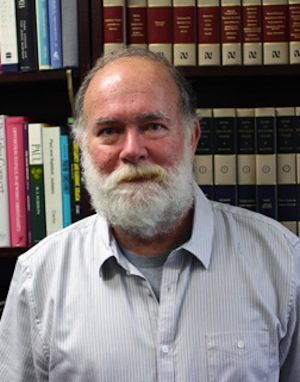John C. Reeves, Blumenthal Professor of Judaic Studies, named ACLS Fellow

John Reeves, Blumenthal Professor of Judaic Studies in the Department of Religious Studies, has received a prestigious American Council of Learned Societies Fellowship for 2015-16 to work on his project “Illuminating the Afterlife of Ancient Apocryphal Jewish Literature.”
This year, ACLS made 70 awards to faculty of all ranks and independent scholars to support research in the humanities and humanistic social sciences. ACLS received over 1,000 applications in this cycle, making the program once again the most competitive in ACLS’s portfolio.
Reeves’ project concentrates upon the history of the transmission of ancient Jewish literary texts and non-canonical lore among a variety of Near Eastern religious communities and movements during late antiquity and the early medieval period. Relatively little attention has been devoted to exploring the afterlife of apocryphal works among literate circles within the Islamicate cultural sphere wherein Jewish, Christian, Muslim, and other scriptural communities were active contributors and interlocutors. Shining light on the shadows that obscure this lively textual commerce, and unraveling the tangled web produced by the intercultural sharing of extracanonical textual lore, are the primary goals of this project. It also tracks the peregrinations of these texts and traditions from literate circles in the East to Jewish (and other) communities located in the West.
The competition judges commented that Reeves’ project is “… a fascinating project of hidden cultural history … [with] significant value for the humanities ….”; “… the culmination of long years of detailed research and confirms the applicant as uniquely positioned to carry out the plan of work”; “it cannot be stressed how important it is to fill this lacuna … a breath of fresh air in a very constricted discipline ….”
A native North Carolinian, Reeves came to Charlotte in 1996 after serving as assistant and then associate professor of religious studies at Winthrop University. Much of his work probes the margins of conventionally conceived categories, exploring the overlaps and commonalities discernible among a host of Near Eastern fringe groups and texts which inhabit the twilight realms of cosmic arcana, apocalyptic fervor, and religious dualism in late antiquity and the medieval era. He earned his doctoral degree from Hebrew Union College-Jewish Institute of Religion.
ACLS uses a rigorous multi-stage peer-review process to ensure that humanities scholars themselves select those fellows who exemplify the very best in their fields, said Matthew Goldfeder, ACLS director of fellowship programs.
“Fellows were chosen for their potential to create new knowledge resulting from investigations and reflections on diverse cultures, texts, and artifacts from across the globe and human history,” Goldfeder said. “The 70 fellows this year represent more than 50 colleges and universities and an array of humanities disciplines, including linguistics, religious studies, architectural history, and geography.”
ACLS Fellowships allow scholars to spend 6 to 12 months on full-time research and writing. The program is funded by ACLS’s endowment, which has received contributions from The Andrew W. Mellon Foundation, the National Endowment for the Humanities, the Council’s college and university associates, past fellows, and individual friends of ACLS. ACLS is a prominent consortium of American learned and professional societies such as the American Academy of Arts and Sciences, the Modern Language Association and the American Academy of Religion.